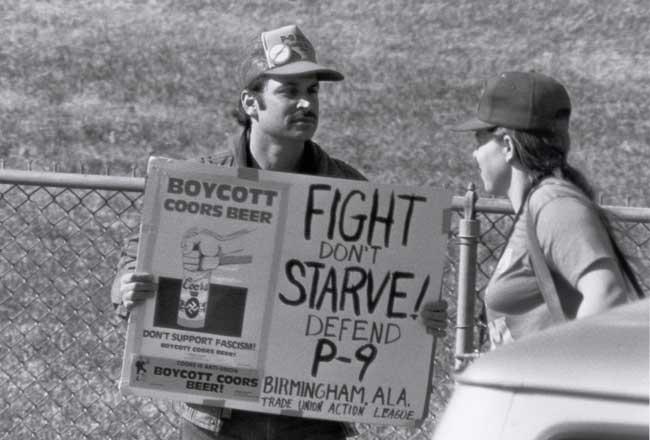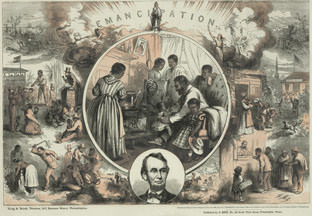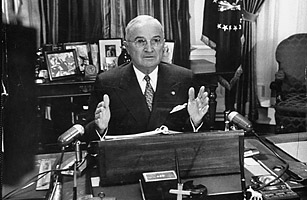
This Day in Labor History: April 11, 1986. Police tear gas strikers at the Hormel plant in Austin, Minnesota. Let's talk about the infamous Hormel strike and the horrible choices unions had to make in the awful 1980s! 

The Hormel Strike was notable both for its militant local and the reluctance of the UFCW to put up a strong fight against contractual rollbacks. It also pioneered the modern corporate campaign as a labor tactic.
Most importantly, the Hormel strike was a sign to the entire nation of the weakness of the labor movement by the late 1980s and the aggressive actions companies would now take to destroy their employees’ unions, a trend that has continued to the present.
In 1985, Hormel decided to bust the United Food and Commercial Workers union in its plant. Average wages in meatpacking plummeted in the early 1980s as capital mobility busted the industry’s unions.
In 1982, meatpacking average hourly wages were $9.19. By January 1985, they had fallen to $7.93. Hormel demanded a 23 percent pay cut for the workers in Austin, to $8.25, even though the company made a $29 million profit in 1984.
The Austin plant was a new, state of the art facility that could have been a model for a new day of labor in the industry, but Hormel ran a speedup and had a terrible safety record in the plant even before it demanded the wage decrease.
Originally the United Packinghouse Workers, a CIO-affiliated industrial union that cleaned up the horrible conditions Upton Sinclair described in The Jungle, the United Food and Commercial Workers represented workers in the industry.
In the wake of labor’s overwhelming defeat in the PATCO strike, when Reagan destroyed the air traffic controllers union, UFCW leadership, like most of the rest of American labor, was afraid to challenge companies on anything because they too feared destruction.
Nationally, UFCW acquiesced to these pay cuts because it feared a worse result if it said no.
But UFCW did not do this with the consent of the local. Local P-9 defied international leadership, preferring to go down fighting than just give up everything they had fought for over the previous decades.
In response, 1500 workers walked off the job in August 1985, a strike that would last ten months. P-9 proved quite resourceful. It began what is known as corporate campaigns, hiring a PR person to go after Hormel nationally.
That included national newspaper ads targeting the company’s poor labor practices, picketing at the company’s national headquarters, and turning a local campaign in a Minnesota town into a national event in order to gain public attention for their cause.
This was not that different from how Cesar Chavez used white supporters around the nation to bring publicity to the cause of farm workers in the California fields.
Among the successes of the corporate campaign was discovering connections between Hormel and the apartheid government of South Africa, leading to statements of support for P-9 from the African National Congress.
Nationalizing the cause was effective and brought Hormel unwanted publicity. National supporters sent money to P-9.
Although the days of the union ladies’ auxiliary was long in the past, the wives of P-9 workers took the lead in organizing national fundraising, clothing drives, and other activities to sustain the strike. P-9 roving pickets at Hormel plants did have concrete results.
But nationally, the UFCW opposed all of this. One shift of workers in Algona, Iowa crossed the picket lines because of orders from the union to ignore the pickets.
At the Fremont, Nebraska plant, the union told workers that if they honored the picket line, they would be violating their own contract. Only 65 of 850 did so.
Workers at a Dallas factory did respect the lines and briefly shut down this facility, but without support from the international, this proved very hard to maintain.
When 750 workers in Ottumwa, Iowa honored the pickets, Hormel fired 500 because of the violation of the contract’s no strike pledge.
Hormel was annoyed by the corporate campaign but it made no difference to corporate strategy. It brought strikebreakers to Austin, getting them into the plant with the help of the National Guard. This undermined the strike itself.
460 members crossed it to retain their jobs after the company imported enough strikebreakers to get the plant started again. After 6 months, seeing a lost cause, UFCW leaders ordered P-9 to end the strike. An overwhelming majority of the workers voted no.
At that point, the UFCW put the local into receivership and took it over. By September, UFCW negotiated a new four year contract with lower wages, the elimination of a guaranteed annual wage, and the 52-week layoff notice that the workers had originally won in 1940.
Of the remaining 850 workers who had not crossed the picket line, fewer than 100 ever received their jobs back. A year later, Hormel demanded further concessions. When the union refused, the company outsourced most of the jobs.
Hormel later leased most of the factory to Quality Pork Processors, which took over the most dangerous pork slaughtering functions in the plant.
By the mid-1990s, QPP had replaced most of the labor force with Mexican labor, recent migrants who would take jobs with declining safety standards at low wages.
In my view, perhaps the most significant thing about the Hormel strike is not the corporate campaign, a strategy beloved by many liberals, nor the defeatist behavior of UFCW leadership, but rather the aggressiveness by Hormel.
By 1986, American corporations simply stopped caring about the appearance of compromise with organized labor. Capital mobility was in full effect by this time.
The rise of Reagan and the growth of open union-busting after PATCO took off the facade that corporations ever accepted unions in their factories (despite the necessity for rhetoric claiming it was so in the 1950s and 1960s, rhetoric too often taken at face value today).
Hormel’s open contempt for anything the UFCW could do was notable to everyone involved. It’s why that while the UFCW international leadership comes out of this strike looking really bad, in a sense their position is understandable. P-9 decided to go down fighting.
They had the right to do that and UFCW should have supported them. UFCW’s actions in attacking P-9 president Jim Guyette (who international leadership saw as a real threat and thus red-baited him) were reprehensible. But it was truly a lost cause.
Hormel had all the momentum and all the ability to simply close factories and move.
Some will argue that the Hormel strike shows the moral bankruptcy of business unionism and the potential of corporate campaigns, and while I don’t totally disagree with that......
....I think any larger examination of the larger trajectory of the meatpacking industry during these years should make one skeptical of the potential that this strike could have succeeded.
The Hormel strike is perhaps most famous today for being chronicled in Barbara Kopple’s American Dream, not exactly one of the most uplifting films about American labor you’ll see.
The failure of the Hormel strike and the horrible internal struggle became a national symbol for labor’s hard times.
For further reading, see Peter Rachleff, Hard-Pressed in the Heartland: The Hormel Strike and the Future of the Labor Movement.
Back tomorrow to discuss the 1934 Auto-Lite strike in Toledo, one of the truly iconic moments in that great year of American labor militancy.
• • •
Missing some Tweet in this thread? You can try to
force a refresh







